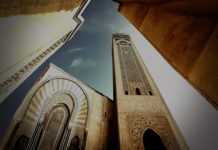As-Safar said: Abû Bakr fell ill, so some people visited him and asked whether they should call a doctor for him. He said,The Doctor has already seen me. They asked, What did he say? Abû Bakr said, He said, I do what I want. (Meaning, that Allâh is his Doctor and can make him sick or healthy as He wills) (Ahmad).
Umar ibn al-Khattâb (RA) said:
| The best days we ever lived were by virtue of patience, and if patience were to take the shape of a man, he would be a noble and generous man. |
Alî ibn Abî Tâlib (RA) said:
| The relation of patience to îmân is like the relation of the head to the body. If the head is chopped off, the body becomes useless. Then he raised his voice and said: Certainly, the one who has no patience has no îmân, and patience is like a riding-beast that nevers gets tired. |
Umar ibn Abdul-Azîz said:
| Allâh never bestows a blessing on His slave then takes it away and compensates him by giving him patience, but that with which he has been compensated is better than that which has been taken away from him. |
The story of Urwah ibn al-Zubayr
Urwah ibn al-Zubayr came to visit the Khalîfah al-Walîd ibn Abdul-Malik. With him was his son Muhammad, who was one of the most handsome of men. The young man had dressed up for the occasion in fine clothes, and had his hair in two plaits or braids. When al-Walîd saw him, he said, This is how the young people of Quraysh look! and by so saying, put the evil eye on him. Before he left, the young man fell ill. When he was in the stable (preparing for the journey) he fell down, and the horses trampled him to death.
Then Urwah got gangrene in his leg, and al-Walîd sent doctors to him, who suggested that the leg should be amputated, otherwise the gangrene would spread to the rest of the body and kill him. Urwah agreed, and the doctors began to remove his leg, using a saw. When the saw reached the bone, Urwah fainted, and when he came around, sweat was pouring down his face, and he was repeating, Lâ ilâh ill-Allâh, Allâhu akbar. When the operation was over, he picked up his leg and kissed it, then said, I swear by the One Who mounted me on you, I never used to walk to any place of wrong action or to any place where Allâh would not like me to be. Then he gave instructions that the leg should be washed, perfumed, wrapped in a cloth and buried in the Muslim graveyard.
When Urwah left al-Walîd and returned to Madînah, his family and friends went to meet him at the outskirts of the city and to offer condolences. The only reply he made was to quote from the Qurân:
truly we have suffered much fatigue at our journey (al-Kahf 18:62). He did not say any more than that. Then he said, I will not enter Madînah, for people there either rejoice over the afflictions of others, or else feel envy for their blessings. So he went to stay in a place at al-Aqîq. Îsâ ibn Talhah came to visit him there and said, May your enemies fathers perish! and asked him, Show me the affliction for which I have come to console you. Urwah uncovered his stump, and Îsâ said, By Allâh, we were not preparing you to wrestle! Allâh has saved most of you: your sanity, your tongue, your eyesight, your two hands, and one of your two legs. Urwah told him, Nobody has consoled me as you have.
When the doctors came to perform the amputation, they had asked Urwah whether he would drink intoxicants to ease the pain. He said, Allâh is testing me to see the extent of my patience. How could I go against His commands?
Beautiful patience (sabr jamîl Yûsuf 12:83) and panic
Mujâhid said: Beautiful patience is patience without any panic. Amr ibn Qays said: Beautiful patience means to be content with adversity and to surrender to the will of Allâh.
Yûnus ibn Yazîd said: I asked Rabîah ibn Abdul-Rahmân: What is the ultimate of patience?He said: To be outwardly the same at the time of affliction as one was the day before it struck. (This does not mean that a person does not or should not feel pain or anguish; patience in this instance means that one refrains from panicking and complaining.)
Commenting on the meaning of beautiful patience, Qiyas ibn al-Hajjâj said:
| The person who is suffering from some affliction should behave in such a way that nobody is able to distinguish him from others. |


















































